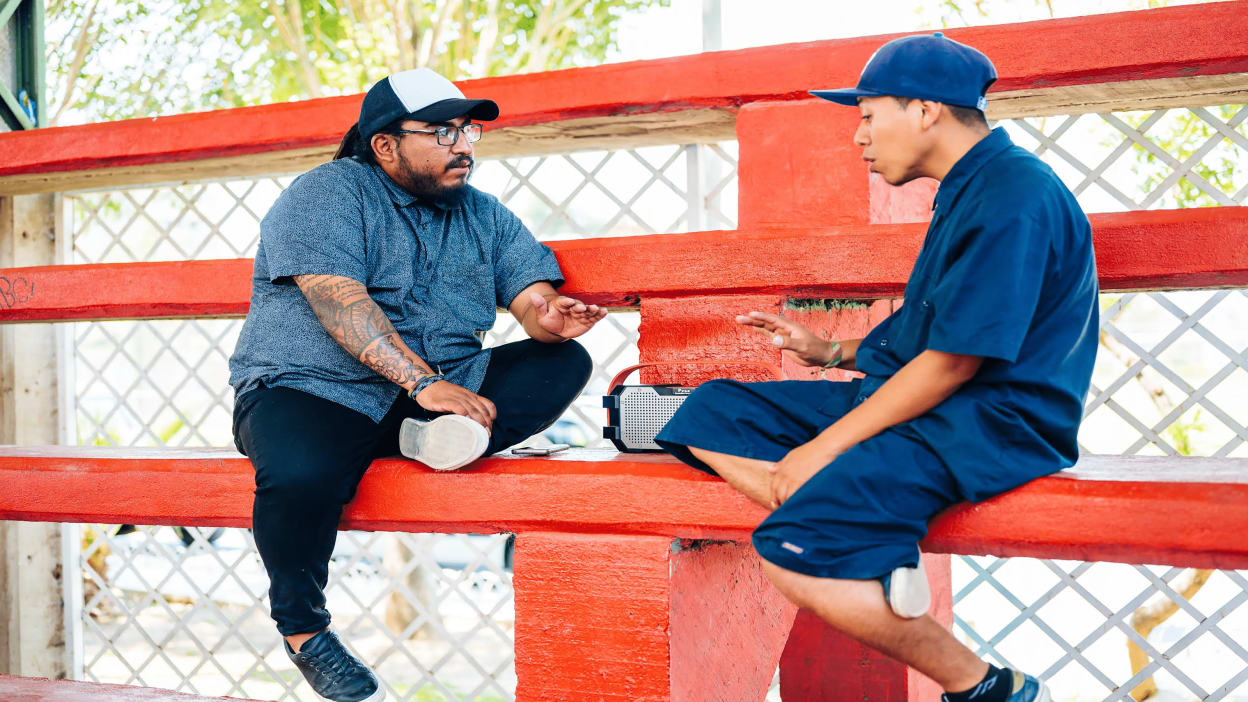How to win friends and influence people (on climate change)
Megan shares ideas about how to have better conversations with friends and family about the climate crisis.
Written by Megan Hermes | 13 Apr 2022



Rafael and Renato having a conversation on a bench. Image credit: Tom Price-Ecce Opus/Tearfund
It turns out good conversations about the climate don’t have to be as complicated as I sometimes make them. There are some basic principles that are helpful – which apply to good conversations about anything. Over decades people have turned to Dale Carnegie’s best-selling book, How to make friends and influence people. Here are a few simple pointers based on Carnegie’s book to help you talk to your friends about the climate crisis and still be friends at the end of the conversation.
Do not criticise, condemn or complain
As Carnegie says, ‘Any fool can criticise, condemn or complain – and most fools do.’ It’s easy to fall into criticism if you’re working hard to campaign for change and are frustrated by others’ apathy. Feelings of criticism and condemnation tend to overtake patience and feelings of empathy with those further behind or not yet on a journey with this. But criticism isn’t usually inspiring. So why not share more about the hope we have for a better future, especially as people of faith? Share the vision: don’t critique. We all started with small steps, so encourage others to do the same.
Be generous with praise
As with the first prompt, this is a worthwhile reminder for us all. When faced with the scale of the climate crisis it can be easy to feel inadequate, but these feelings are neither inspiring nor motivating for ourselves or others. So when having conversations with friends about lifestyle changes, remember to be generous with praise. Be sure to notice the changes people around you are making – no matter how small – and encourage them. Every step matters and positive reinforcement is effective. Let’s cheer each other on before rushing ahead to what’s next.
Be quick to acknowledge your own mistakes
When I first started campaigning for climate justice, it seemed others feared I might judge them. Friends would hide plastic purchases from me, or apologise for having a disposable cup. I realised it was important to be quick to acknowledge my own mistakes and learnings. Showing humility about our own journeys makes those around us less defensive. The good news is that people are inspired by reality, not something they see as unattainable, so you don’t need to wait until you are 100 per cent zero-waste to inspire those around you to make changes. Sharing our own shortcomings can also open up a conversation about how others have overcome challenges we might be facing.
Don’t attempt to ‘win’ an argument
For many of us the science around climate change is undeniable, but if the facts were enough to urge people to action then we’d have solved the crisis already! This is something I’ve struggled with personally: in the past, I’ve been quick to try to disprove someone's inaccurate claims about climate change in an attempt to win the argument. But this is not likely to win them over to my way of thinking.
It’s important that we recognise and remember that people get information through a lot of different voices and sources, and can sometimes find it hard to figure out who to listen to. Sometimes people hold onto beliefs because of fears, insecurities or other, deeper factors. Making someone feel stupid or hurling facts at them generally makes people dig their heels in and close off to other perspectives. Instead, share with them the vision you have for a cleaner, greener future. Paint them a picture of what the world could look like if we all cared for creation.
Find common ground
The climate crisis covers a range of issues, some galvanising, others polarising. Most of us want a world that is fair, that doesn’t keep people living in poverty. For those of us who are Christians, we can agree that we’re called to love our global neighbours, even if we may disagree on how best to do this. This is common ground you can begin with, before easing your way into the more difficult subjects. At its core what we’re seeking to communicate is simply our shared calling to love those living in poverty, and climate action is one way we can do that.
Finally, ‘learn to plant the seed,’ as Carnegie puts it. Remember that most of us didn’t change overnight. Your conversations have the power to plant a seed that will create powerful change – but that change might not always happen immediately. I am thankful to all those who took the time to have conversations with me about lifestyle changes they were making, climate justice and creation care. It’s my hope and prayer that I can sow seeds for change through my conversations. For those who have ever felt discouraged by a conversation about the climate emergency, let us pray that the seeds we leave behind may have deep roots and lead to lasting change.
If you find yourself having conversations with friends and family and need some resources to point them towards, check out our guide to some simple first steps they can take.
Written by
Written by Megan Hermes
Similarly Tagged Content
Share this page
Share this page to spread the word and help support those in need.

Get our email updates
Learn about our work and stay in touch with Tearfund. Hear about our news, activities and appeals by email.
Sign up now - Get our email updates






